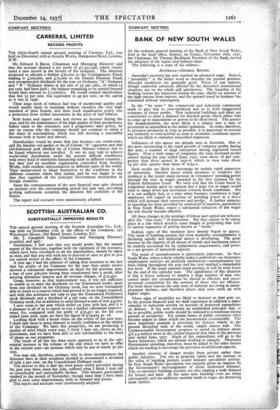COMPANY MEETING
BANK OF NEW SOUTH WALES
AT the ordinary general meeting of the Bank of New South Wales, held at the head office, Sydney, on Friday, November 26th, 1937, the Chairman, Sir Thomas Buckland, President of the Bank, moved the adoption of the report and balance-sheet.
The following is a copy of his address :
AUSTRALIA—GENERAL REVIEW.
Australia's recovery has now reached an advanced stage. Indeed, " prosperity " is the better word to describe the present position. Seasonal conditions are generally good. Prices of our exports, though somewhat adversely affected by the disturbed international situation, are on the whole still satisfactory. The liquidity of the banking system has improved during the year, chiefly on account of the high returns from exports, and the upward trend in business has continued without interruption.
In the " fat years " the commercial and industrial community tends to give way to over-optimism and so to hold exaggerated estimates of future profits. New industrial buildings and plant are constructed to meet a demand for finished goods which either fails to come up to expectations or proves to be short-lived. The greater the disappointment, the more likely is a relapse into a state of pessimism as unjustified as the earlier optimism. In order, therefore, to preserve prosperity as long as possible, it is important to restrain any tendency to over-activity as soon as economic conditions appear which are likely to stimulate unjustified expansion.
Influences of this nature are already seen in Australia. One of the most outstanding is the rapid growth of company profits during last year, a number of large enterprises having registered record figures. Over a wide range of companies the total disclosed profits earned during the year ended June, 1937, were about 18 per cent. greater than those earned in 1935-6, which in turn were about 14 per cent. greater than those of 1934-5.
Such results are likely to encourage an unduly rapid expansion of operations. Another factor which promises to reinforce this tendency is the recent sharp increase in consumers' spending power through the rises in wages awarded in the first instance by the Federal Arbitration Court. We were told that the Court based its judgement mainly upon its opinion that a large rise in wages would tend to damp down any movement towards boom conditions. But it is not unlikely that, at a time when business confidence is high, employers will regard an increase of spending power as a factor which will increase their turnovers and profits. A further stimulus to spending has been provided by remissions of taxation, particularly in New South Wales, where a substantial reduction of the wages tax will shortly become effective.
All these changes in the earnings of labour and capital are welcome after the " lean years " of depression. But they appear to be taking place at a rate which involves some danger of generating that state of unwise expansion of activity known as " boom."
Indeed, signs of this tendency have already begun to appear. The value of building permits has risen markedly, unemployment is declining rapidly and industrial unrest is developing. The great increase in the imports of all classes of metals and machinery cannot be entirely accounted for by replacement requirements, and points to a net growth of industrial capacity.
The trend of unemployment is particularly important. In New South Wales, where a fairly reliable index is published—no Australian employment statistics are perfectly satisfactory—unemployment has been falling throughout the year and has now reached a remarkably low level. If the usual seasonal trend persists, it will be even lower by the end of the calendar year. The significance of this situation is that it forces industry to employ a large number of men who cannot under any circumstances be classed as efficient, and causes increased competition for the services of those who are efficient. For both these reasons the unit costs of industry are rising as unem- ployment declines, and therefore prices may soon catch up with higher wages.
These signs of instability are likely to increase as time goes on. In the present financial year we shall experience in addition a major stimulus to industrial activity on account of increased expenditure on defence. It has now become an established principle that, as far as possible, public works should be reduced to a minimum during periods of prosperity. Yet certain forms of public enterprise often become urgent at times which are inconvenient economically. The most important example is provision for defence which, in the present disturbed state of the world, simply cannot wait. The Commonwealth Government proposes to spend on defence about £A.3.4 million more in the current financial year than in the previous year ended June, 1937. Much of this expenditure will go to the heavy industries, which are already working to capacity. Necessary Government spending, therefore, must be added to the other factors which are tending to encourage the provision of additional capacity.
Another element of danger results from private rather than public initiative. The rise in property values and the increase in the value of building permits issued indicate speculative activity. In New South Wales speculation was recently given an impetus by the Government's encouragement of closer settlement schemes. The co-operative building societies are also creating a wide demand for houses and land. At the same time building costs are rising substantially and the additions recently made to wages are increasing them further.


































 Previous page
Previous page